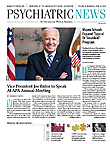Because depression rates for women and men differ, researchers have been trying to determine whether etiologic pathways for the disorder differ across gender lines.
Kenneth Kendler, M.D., a professor in the departments of Psychiatry and Human and Molecular Genetics at Virginia Commonwealth University School of Medicine, led a study identifying factors that distinguish the onset of major depression between men and women. The study was published February 14 in AJP in Advance.
Kendler noted that previous studies comparing the etiology of depression between men and women only examined single risk factors, such as marital status or quality, stressful life events, or prior anxiety disorders. Kendler explained to Psychiatric News that his current study differs from the previous ones in several ways.
“First, we explored a very wide array of risk factors organized developmentally. Second, we used a path model approach, which can show ‘the pathways’ of risk over time. Third, we studied twins of opposite sex to get the best control for genetic backgrounds and family environment and rearing experiences.”
Kendler and colleagues assessed 1,057 adult opposite-sex twin pairs born between 1940 and 1974 for the incidence of major depression within a given year, as well as 20 risk variables that may contribute to such incidences. The patients were interviewed on risk variables associated with five developmental periods: childhood, early adolescence, late adolescence, adulthood, and past year. Major depression was diagnosed according to DSM-III-R criteria.
The results showed that 11 of the 20 risk variables differed across gender lines as they related to development of major depression. Parental warmth, neuroticism, divorce, social support, and marital satisfaction had the strongest impact on development of depression in women, whereas childhood sex abuse, conduct disorder, drug abuse, history of major depression, and distal and dependent proximal stress life events had the largest impact in men.
“The developmental pathways to depression in men and women share some important elements, but on average differ from each other in some important ways,” Kendler said.
In characterizing their findings, the researchers pointed out that “deficiencies in caring relationships and interpersonal loss” played a stronger etiologic role in major depression for women, while “failures to achieve expected goals, with lowered self-worth” were more important in the etiologic pathway to major depression for men.”
According to Kendler, the current findings are consistent with previous studies that suggest differing subtypes of etiologies for major depression in women and men.
Kendler told Psychiatric News that whether the findings from this study can translate into differences in psychotherapeutic treatment responses between men and women is a question that remains to be answered.
He is preparing to initiate a large-scale study investigating molecular genetic factors underlying depression in women.
The study was funded by the National Institutes of Health. ■
“Sex Differences in the Pathways to Major Depression: A Study of Opposite-Sex Twin Pairs “ can be accessed
here.

